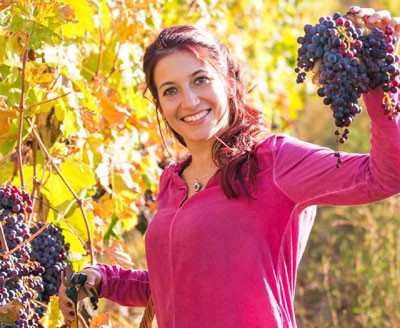Wine has been an important element of the tradition, the life and a staple in the diet of Bulgarians since ancient times. The fertile soil and the temperate continental climate in this country combine to create just the right conditions for growing different grape varieties like Cabernet, Merlot, Gumza, Pamid… There are other, specific varieties that thrive in specific regions – like Shiroka Melnishka Loza (broadleaved Melnik vine), Melnik 55 and Ruen – which are to be found in the Southwestern portion of Bulgaria.
It is in that part of the country – in the region around Melnik, that our thirst for travel takes us, for a glass of aromatic wine that will linger in our memory. Glass in hand, we shall endeavour to find out more about the rich cultural and historical heritage of the region, and the traditions typical of winemaking in these parts. Something that is not easy to do, unless we find a local “wine guide” ready to help us. Or we can open the user-friendly bilingual map “Melnik wine routes”. The two languages are Bulgarian and English, and even though it is published in a small print run, the information it offers is updated every year, as most wine producers are eager to be included. The map shows all wine cellars, as well as the vineyards that have a brand of their own but no cellar. The map is handed out, free of charge, at specialized wine events, as well as at the tourist offices in Sofia and in Bansko. What else does the map include? Militsa Zikatanova, author of the map:
 “The map also features the principal cultural, natural and historical landmarks in the region, locked between the towns of Sandanski, Petrich and Melnik. There are religious monuments in our region that are a magnet to tourists – like Rozhen Monastery, the St. Petka church in Rupite, the St. George church in Zlatolist village and the legend of Stoyna who once lived there. We have included natural landmarks like Pirin National Park, Skoka waterfall close to the mysterious village of Lyubovishte etc. Out of the historical landmarks we have included the archaeological site Heraclea Sintica – an ancient town close to Petrich with a history that is simply fascinating. We have a museum of archaeology and of history in Sandanski, and many other places in the vicinity well worth visiting. It is a superb weekend destination, but also a place to visit for a longer period.”
“The map also features the principal cultural, natural and historical landmarks in the region, locked between the towns of Sandanski, Petrich and Melnik. There are religious monuments in our region that are a magnet to tourists – like Rozhen Monastery, the St. Petka church in Rupite, the St. George church in Zlatolist village and the legend of Stoyna who once lived there. We have included natural landmarks like Pirin National Park, Skoka waterfall close to the mysterious village of Lyubovishte etc. Out of the historical landmarks we have included the archaeological site Heraclea Sintica – an ancient town close to Petrich with a history that is simply fascinating. We have a museum of archaeology and of history in Sandanski, and many other places in the vicinity well worth visiting. It is a superb weekend destination, but also a place to visit for a longer period.”
Other sites included in the wine tours are Melnik’s Wine Museum and the Kordopulov house built in 1754 by one of the leading local families – wine producers and traders. Their wines were of top quality, and were sold in Vienna, Budapest, Venice and Paris.
Militsa says the region is popular with tourists from all over the world, but most of all from Bulgaria and from Romania, people who stop by on their way to Greece. What keeps them here for a longer period, or prompts them to come back again is the amazing nature, but also the many mineral springs the area is studded with - in and around Sandanski there are more than 80.
If all this has intrigued you, if you want to take a break from life in the fast lane, then it is time to give yourself a special present – a trip to a delightful part of Bulgaria, its southwestern corner. What better time to make this trip than on 14 February – the day of love and wine! Bulgaria’s smallest town, Melnik, will give you a bewitching welcome. And one more thing – from 14 to 17 February the wine cellars in the region will throw open their doors to the public, and offer visitors demonstrations of the traditional pruning of grapes, wine tours and wine tasting, local farmer markets and a colourful folklore programme.
English version: Milena Daynova
Photos: archive